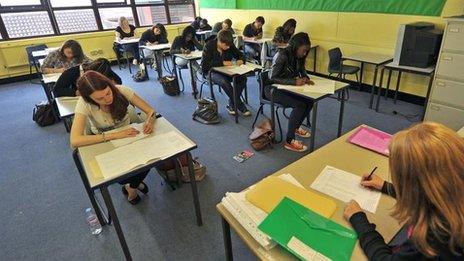The rise and rise of global school rankings
- Published

International tests have become an important driving force in setting education policy and their influence seems to be growing.
For the first time, England's exams are going to be linked to an international benchmark, with the new grading system for GCSEs being pegged to the Pisa tests run every three years by the OECD.
Not that long ago, few people would even have heard of the Pisa tests, now they're being used as a kind of global educational gold standard.
It's like football clubs wanting to test themselves in the Champions league rather than count their domestic trophies.
And it means that in future, the difficulty of exams taken by England's school pupils will be linked to what's happening in classrooms on the other side of the world.
It's a signal that international comparisons are now an inescapable dimension of measuring school standards.
Just as you wouldn't look at an economy in isolation from other countries, so too it seems increasingly difficult to measure an education system without reference to what is being achieved elsewhere.
Andreas Schleicher, the presiding authority over the Pisa tests, has become a global education guru, delivering his findings to political leaders like Moses coming down from the mountain, with his commandments on an iPad rather than tablets of stone.
Changing world view
The Pisa tests have created a different map of the world.
They show the ambitions of rising economies in Asia and the rather faded glories of the old western powers.
Without such tests, how else would we know that school standards are now higher in Vietnam than in the United States?
Another set of test results this week gave a more optimistic view of England's teenagers.
The OECD's league table of problem solving skills put England into a very respectable 11th place.
This suggested that the school system is producing young people with enough rounded skills to be able to apply their knowledge.
Such wider perspectives would have been impossible if the only yardstick was comparing this year's GCSE results with last year's.
There are critics of such international rankings, who say that it's not meaningful or fair to compare such different countries.
How can you measure an affluent Scandinavian country with a sprawling industrialised superpower or an emerging Asian city state?
It might not be fair, but in a global economy young people from all those places will be competing with each other.
And the outcomes are far from a foregone conclusion. Sweden has tumbled behind countries such as Poland and Estonia.
But what difference does it make?
As Mr Schleicher puts it: "Your education today is your economy tomorrow."